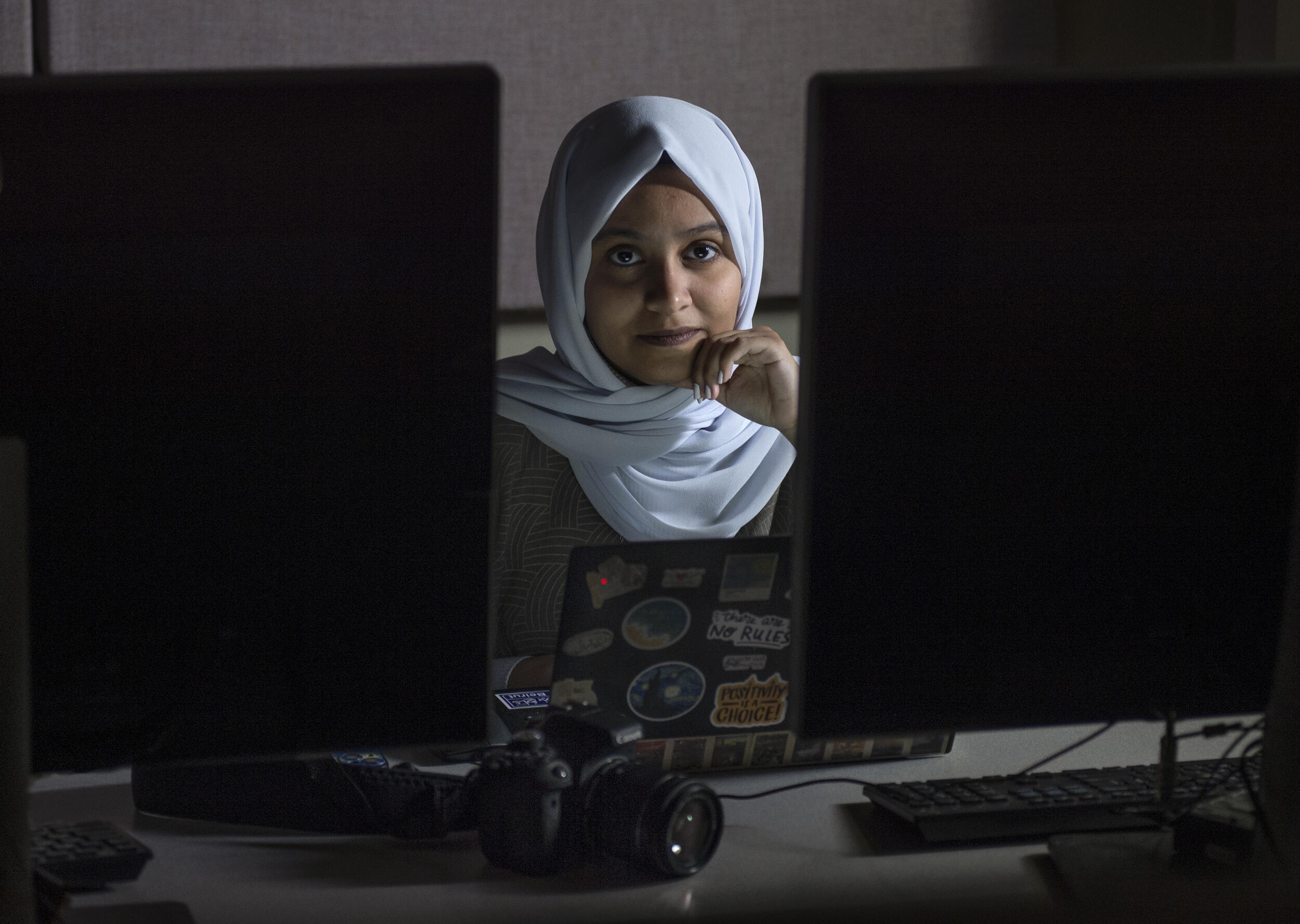
Dec. 19, 2023
During a semester at VCU, study-abroad student from Yemen finds artistic inspiration
Share this story
The arts are a calling card of Virginia Commonwealth University, and for a visiting student from Yemen, her study-abroad semester on campus this fall was a lesson in both culture and commitment.
Wala Al-Sadi is enrolled at Lebanese American University in Beirut, where her passion for the arts and her homeland’s history intensified – one of her recent projects is an archive that documents artistic elements of Yemeni history. In spending a semester at VCU, Al-Sadi saw a chance to expand her education and her global perspective.
“I chose VCU because it has a lot about culture and arts, and it’s very diverse in this field,” she said. “I’m very interested in culture and the artistic side of everything – in film production or in paintings, anything related like that. I found VCU very interesting because they have also the Institute for Contemporary Art and a lot of museums around the area. So, it was my perfect choice.”
During her semester on campus, the communication and media production major took classes in marketing, advanced media production, modern art and introduction to gender and sexuality. Al-Sadi also visited museums in Richmond, Washington and New York, studying how they organize their collections to represent cultural expression.
Those visits were an extension of her student experience in Lebanon, where the self-described cultural activist developed the idea last year to create an archive tied to Yemeni artistry.

“Lebanon was an inspiring environment to me, and this is where it all started. When I went to Lebanon, I got inspired by the museum and other things,” said Al-Sadi, who volunteered at the Modern and Contemporary Art Museum in Lebanon. There, she gained exposure to its archive and helped promote its collection through social media videos and posts.
And working by remote with a group of university friends in her homeland, Al-Sadi developed YEMRSH – a mix of Arabic words for Yemen and archive – to document Yemeni female singers, advertising graphic design, theater history and a cultural magazine that collectively help spotlight Yemini art that thrived in the 20th century. With funding from the Goethe-Institut and the German Federal Foreign Office, YEMRSH trained about a dozen volunteers to become researchers.
“It’s about saving the culture,” Al-Sadi said. “I did this project because I felt like Yemeni culture wasn’t getting the attention that it should. It’s so rich. Specifically in my city, Aden, the cultural scene was very active, but because of many political, social and religious changes, it became inactive for a while. And now they’re trying to reactivate it.”
She and her colleagues used social media to reach young Yemenis about the opportunity to join YEMRSH. “We needed people who would love to know about archiving, digitizing and documentation,” Al-Sadi said.
The volunteers worked for three months, digitalizing documents they found during their research and analyzing data that formed an online database. YEMRSH also met with professionals as well as culture and art enthusiasts in Aden to explain their findings, and the group produced a magazine in English and Arabic highlighting their work.
One writer offered this background from the findings: “The leading Adeni female artists played a prominent role in performing classical modern and heritage songs, contributing significantly to the advancement of women’s music in Aden. … Unfortunately, we were saddened by the disappearance of these stars, which dimmed the light of female creativity. We can no longer find their contributions, as they either vanished due to marriage and the responsibilities of building families or passed away or retired from the music scene.”
No contemporary female Yemeni musicians reached the same level of the artists archived in YEMRSH, Al-Sadi said.
After the yearlong YEMRSH project, she is now seeking funds to publish a website of its research and digitized images.
“This could help us to raise awareness about our culture in the Western world,” Al-Sadi said. “There are not many people who are knowledgeable about the culture in Yemen, how rich it is and what we have. I would love for people to explore more into our culture – our history, too.”
VCU art history professor Lisa D. Freiman, Ph.D., agreed. Al-Sadi was among her students in the European Modernism class she taught this past semester.
“This project is historically important, especially because it is taking place in a region that many people in the West don’t know very much about,” Freiman said. “Accumulating an open-source archive that includes important examples of cultural history about Yemeni artists and designers is an essential and advanced project that undergraduates don’t typically initiate themselves. This type of historic record will be fundamental to future research about Yemeni culture.”

In studying at VCU and visiting Richmond and East Coast institutions, Al-Sadi was leaning into newer directions of modern art – in part because a next project could document current paintings in Yemen. She noted that the European Modernism class taught by Freiman was among those that broadened her knowledge and spurred new ideas to preserve the art of Yemen.
Freiman expects her young visitor to continue to shine.
“Wala is young, ambitious and very smart,” her professor said, praising how Al-Sadi both secured initial funding from distinguished institutions and emphasized the training of volunteers in archival and preservation practices. “I can’t wait to see where she takes this project and how her career evolves. She’s a special student.”
Subscribe to VCU News
Subscribe to VCU News at newsletter.vcu.edu and receive a selection of stories, videos, photos, news clips and event listings in your inbox.







